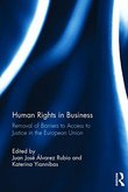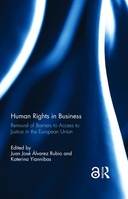Explore

Human Rights in Business
0 Ungluers have
Faved this Work
Login to Fave
The capacity to abuse, or in general affect the enjoyment of human, labour andenvironmental rights has risen with the increased social and economic powerthat multinational companies wield in the global economy. At the same time,it appears that it is difficult to regulate the activities of multinational companiesin such a way that they conform to international human, labour and environmentalrights standards. This has partially to do with the organization of companiesinto groups of separate legal persons, incorporated in different states, aswell as with the complexity of the corporate supply chain. Absent a businessand human rights treaty, a more coherent legal and policy approach is required.Faced with the challenge of how to effectively access the right to remedy inthe European Union for human rights abuses committed by EU companies innon-EU states, a diverse research consortium of academic and legal institutionswas formed. The consortium, coordinated by the Globernance Institute forDemocratic Governance, became the recipient of a 2013 Civil Justice ActionGrant from the European Commission Directorate General for Justice. A mandatewas thus issued for research, training and dissemination so as to bringvisibility to the challenge posed and moreover, to provide some solutions forthe removal of barriers to judicial and non-judicial remedy for victims of business relatedhuman rights abuses in non-EU states. The project commenced inSeptember 2014 and over the course of two years the consortium conductedresearch along four specific lines in parallel with various training sessions acrossEU Member States.The research conducted focused primarily on judicial remedies, both jurisdictionalbarriers and applicable law barriers; non-judicial remedies, both to company based grievance. The results of this research endeavour make up the content ofthis report whose aim is to provide a scholarly foundation for policy proposalsby identifying specific challenges relevant to access to justice in the EuropeanUnion and to provide recommendations on how to remove legal and practicalbarriers so as to provide access to remedy for victims of business-related humanrights abuses in non-EU states.
This book is included in DOAB.
Why read this book? Have your say.
You must be logged in to comment.

